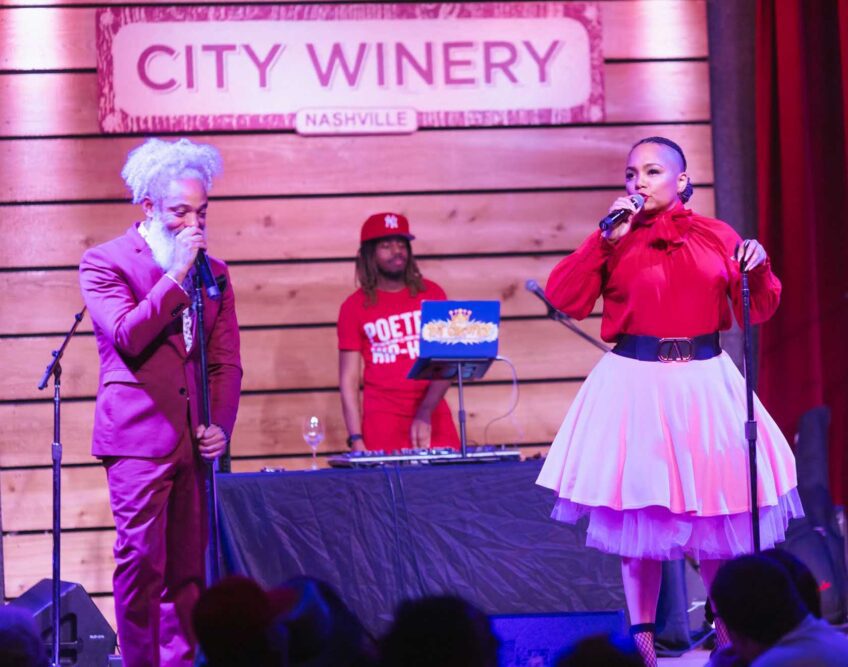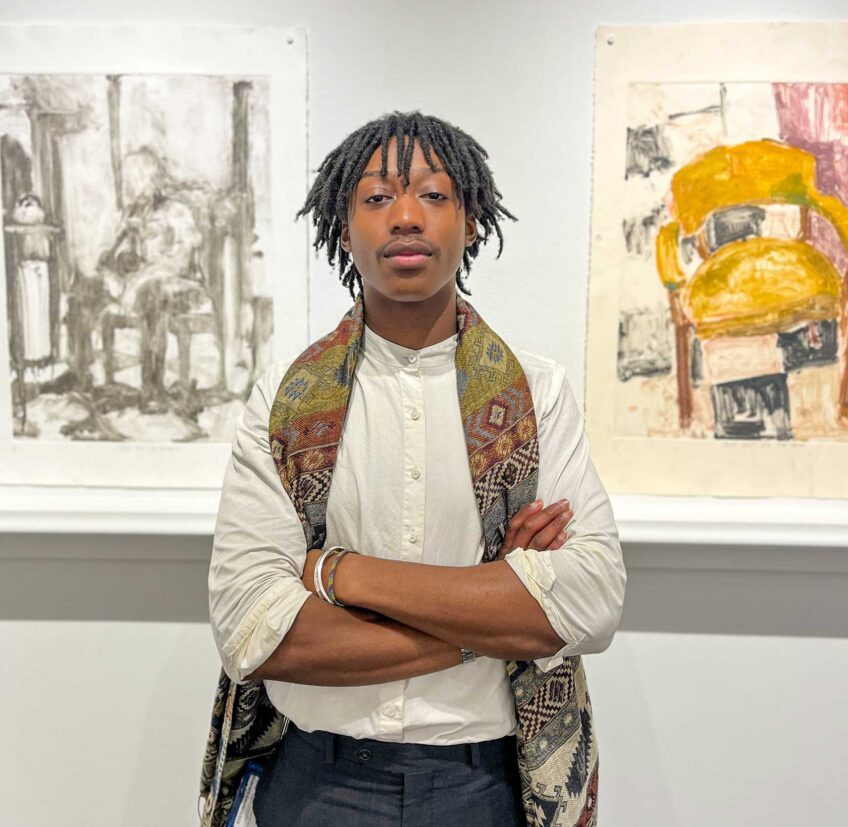A conversation between Beverly Morgan-Welch, executive director of The Museum of African American History, and Barbara Lewis, director of the Trotter Institute.
To expand awareness of the significance of black theater, the William Monroe Trotter Institute for the Study of Black History and Culture at UMass Boston recently presented a staged reading of “The Amen Corner” by James Baldwin.
The reading was convened by Project1Voice in New York and was part of a multi-city tribute to Baldwin that demonstrated the connectedness of black theater across the country.
Paying homage to black theater in Boston is especially apropos since black theater as a literary form came to life in Boston when “Escape; or, A Leap for Freedom” by William Wells Brown was published in 1858.
The Trotter Institute, named after William Monroe Trotter — an early 20th century radical black newspaper publisher — was the only cultural organization in New England to participate in the national reading of Baldwin’s play.
In total, 28 black theaters and cultural organizations in 18 cities did a simultaneous reading of the Baldwin play.
The Boston cast presented the play in the African Meeting House on Beacon Hill. Built by a generation that included veterans of the American Revolution, the African Meeting House symbolized status and autonomy. It was erected in the first decade of the 19th century. Much of the funding came from within the African American community, who galvanized and pooled funds as a result of being denied access to various venues, including churches and galleries.
Frederick Douglass and Maria Stewart — a pioneering female orator — spoke at the African Meeting House. So did David Walker, the radical political journalist and novelist, historian and playwright Brown.
Beverly Morgan-Welch, the executive director of the Museum of African American History, acted in the recent production of “The Amen Corner.” Sarah Ann Shaw, the pioneering Boston journalist, portrayed one of the church elders. “The ancestors,” she said after the performance, “were here, smiling and pleased, urging us on, saying ‘Do more. Keep going.’ ”
Charlotte Golar Richie, senior vice president at YouthBuild USA and former Massachusetts State Representative, played the role of Margaret Alexander, the main character in “The Amen Corner.”
Alexander is the pastor of a storefront church in the North, modeled after the Harlem storefront where Baldwin preached the word when he was a boy. The role of Alexander’s sister is played by Kelly Chunn, local business owner.
Alexander’s estranged musician husband was played by Andre Porter, head of the state’s Office of Small Business and Entrepreneurship. Barry Gaither, head of the National Center for African American Art in Roxbury, an institution started by Elma Lewis, played Brother Boxer, Sister Boxer’s husband.
During a recent rehearsal, Beverly Morgan-Welch had a conversation with me about the staged reading of “The Amen Corner.”
Beverly, what was it about this project that appealed to you?
I have always been attracted to the genius of James Baldwin. He deserves to be remembered and revered.
I acted in “The Amen Corner” while I was at Smith College, majoring in theater and speech. I was in the cast with the late Yolanda King, the eldest daughter of the Rev. Dr. Martin Luther King Jr., one of my dearest friends.
I played Sister Boxer, and Yolanda, whom we called Yoki, played Sister Moore; it was our first opportunity to act together.
The actor Pat Hingle, a father, was visiting and saw our performance. I approached him and he told me that he had been in the premiere of Baldwin’s “Blues for Mr. Charlie” in 1964 with Al Freeman Jr. and Diana Sands.
He was kind and supportive of our work and spoke of what an important privilege it was for him to act in such an amazing play.
What about you, Barbara, why did you want to produce this reading?
I have been a fan of black theater for years. Like you, I am a student of it. My doctorate is in theater. I see black theater as a refuge where blacks can escape and erase the public portrait of criminality.
I’m also excited by the depth of theatrical talent in Boston.
A few months ago, the Kirsten Greenidge play about a younger black immigrant generation was at the Huntington. Akiba Abaka is always doing something interesting. Jackie Davis has a new company, NUTLab, with Cliff Odle, playwright and actor. Benny Ambush, a major director, and Robbie McCauley, actress, director and playwright, are at Emerson. Veronique LeMelle runs the Boston Center for the Arts.
The base for a flourishing black theater presence is here. The more theater we do the more creative juice we have.
Beverly, you say you played Sister Boxer when you were an undergraduate. How easy was it to fit back into the role?
My late husband was a minister, so this play is a very different experience for me now than it was as a college student.
Sister Boxer sees Margaret Alexander, the minister, as having no life outside of the church, and this view is not uncommon. When Sister Boxer is confronted with the evidence that their spiritual leader has led a full life, she has a great deal to say about it.
Barbara, in addition to producing and directing the reading, did you choose a character?
No, I narrated. I let the audience know what is happening; I clarify the story. The play is more than 50 years old so I’ve updated the language a bit. For example, when Margaret Alexander tells her son about the pitfalls of the street, I changed ‘gin mills’ to ‘bar.’ My goal is to pull people into another era but still keep continuity with today.
Beverly, what made you sign on to do this reading? What is the significance of this project for the community?
As we know, plays written by and about black people in America have been written since the early 19th century. However, they are rarely produced, [nor do they] garner the critical acclaim they deserve.
African American authors and playwrights are rare indeed. We must read and know and support this amazing work, especially by the beloved and not yet fully celebrated James Baldwin.
Barbara, what do you think it meant for Boston to be part of this national initiative?
It’s empowering to get together with consolidated strength, talent and commitment. These are hard times. The economy is bad. People are losing homes, jobs. Politically, President Obama is constantly assailed, a target in a shooting gallery.
The reason is often race, although a lot of people don’t want to acknowledge that. So, to come together and feel our collective strength, the wealth of history, and know we have the power to remake the future is exhilarating.




![Banner [Virtual] Art Gallery](https://baystatebanner.com/wp-content/uploads/2024/04/AmberTorres_4-667x848.jpg)

